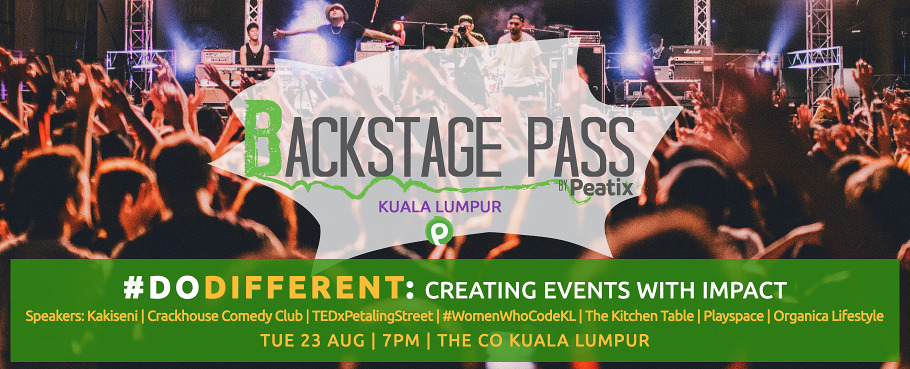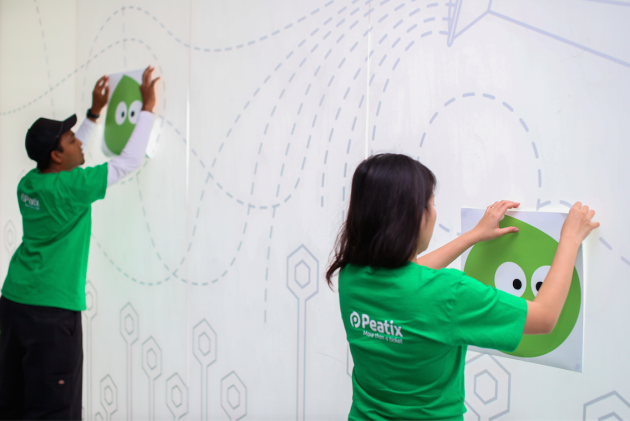It’s hard to imagine how one could ever get bored in Kuala Lumpur. The events scene is well and truly alive with new event concepts popping up all the time, thanks to the many creative individuals who #DoDifferent in events and provide us with a myriad of memorable experiences to choose from!
Backstage Pass KL #DoDifferent edition speakers (from left to right): Crackhouse Comedy Club, Kakiseni, The Kitchen Table, #WomenWhoCodeKL, TEDxPetalingStreet, Playspace
At the sixth edition of Backstage Pass in Kuala Lumpur, a community event for organisers, we invited six speakers from the event genres of the arts, comedy, music, tech, community and food, to share about why and how they run their unique events. We sum up their insight and tips so you too can learn from those who’ve been there and done that.
Low Ngai Yuen, President of Kakiseni
For the uninitiated, Kakiseni is an organisation that works to make the performing arts accessible to everyone and to also provide a platform for the local performing arts industry to thrive. Ngai Yuen leads this initiative and has in turn organised many events to champion her cause including the production of a mobile black box theatrette as part of the Kakiseni International Arts Festival, that’s also travelled to multiple countries around the world! She provides three pointers to think about when organising an event for your community.
- Why: Always know the reason behind kickstarting your event
- What: Define the ideas, mission, or cause you’re championing for, which will shape the rest of your decision making.
- Who: Have your audience in mind when planning. If your audience is not involved, or not informing the decisions you make when planning your event, then your event will be pretty insular and be one that satisfies you but not the community you’re reaching out to.
Mervin Lee, co-curator of TEDxPetalingStreet
TEDxPetalingStreet is the first Chinese TEDx conference outside of Greater China, and it’s aptly inaugurated at Petaling Street, Kuala Lumpur’s Chinatown. With TEDxPetalingStreet, Mervin aspires to empower the future generations to #DoDifferent through hearing from inspirational speakers to interacting with experiential installations. Here’s his recipe for a successful community event:
- Leverage your network. In putting together a team to organise a TEDx event, camaraderie and passion are key components that bring about creative collaboration. As a licensed event, they’re also supported by the wider TEDx family in other countries! If there are events similar to yours elsewhere in the world, do not be afraid to reach out to seek for advise or ask for support.
- Curate your audience. The TEDx attendees are an inquisitive bunch. Curating your audience in a way that your event attracts a like-minded community can make a difference in the experience of your event as it sparks genuine interest, stimulates conversation, and promotes collaboration. You can curate your audience through your event’s program or even through making your event a paid one so only truly interested parties will make the commitment to attend.
- Purposefully create unique experiences at your event. TEDx has fun installations at the event that attendees can interact with, form memories about, and share with others beyond the event.
- Invite engaging speakers. As a talk-focused event, the main draw of TEDx will be the speakers and it will be the main element people will judge the success of the event by. Think about your event’s key component or the reason why people will pay for tickets to attend your event, and make sure that that is done well and even over delivered upon to leave a good and lasting impression on attendees.
Chee Yim Goh, Director of #WomenWhoCodeKL
Community building through #WomenWhoCodeKL was a happenstance for Chee Yim when one day she was asked if there were communities in KL that support women to take up coding but found none, and the rest is history. She has four tips to make running events sustainable.
- Have fun! Events never go as planned, so go with the flow, or you’ll find you’ll be easily upset.
- Find a like-minded partner to run events with you. It’s important to share the same vision to guide the decisions you make.
- Have a plan to grow your event organically. This includes having as may events as possible so people will come to know about them. Have a team so your community does not die with you. Look out for people who join your event for more than three times as this indicates a strong interest in what you do, and ask if they’d like to join you in organising it.
- Partner with other organisations. This will help you go far in your budget, and with reaching more of your target audience.
Marcus Low, Founder of The Kitchen Table Supper Club
Coming from an engineering background, Marcus’ first foray into the restaurant business was as a dishwasher! He eventually apprenticed under the head chef in that very same restaurant to pick up the art and science of cooking. Upon returning to Kuala Lumpur, he began testing out his newfound cooking skills through putting together a supper club with a fresh new menu every month. He has four tips on organising food events.
- Sell an experience. It’s not what you do, but how you make attendees feel that will get them remembering and talking about your event for months to come.
- Do not be afraid to fail. Try new things and test constantly. You’ll be amazed at the innovation you can procure and the results you can get when you dare to break barriers.
- Ensure your team shares the same values as you do so the experience turns out consistent at every event.
- Leverage on the power of community to spread the word about your event.
Cathy Chin and Melina William, Co-Founders of Playspace
Playspace is a performance venue that prides itself in giving the best space to experience an intimate gig through perfecting the art of managing and being uncompromising on sound and lighting, and providing ample space for the audience on the floor. They impart six things they’ve learnt through hosting numerous gigs.
- Put the right team together, one with complementary skills.
- It pays to know your licenses. There are a ton, so get them sorted before hosting your gig lest you have to cancel because of a license you do not yet possess.
- Start with an idea and look for collaborators. It’s possible to run it all on your own, but more fun and less stress when you work with like-minded others.
- Promotion and publicity is the bridge to getting the word out about your event. Have a good and fast designer, use a trusted ticketing site that also gets the word out for your event, and hire a marketer to run your social media accounts.
- Have a host to bring up the atmosphere at your events. Malaysians are a shy bunch and this will help lighten up the mood and get them out of their shells.
- Tips on selling more tickets: Malaysians are notoriously relaxed about buying tickets early so you too should relax if ticket sales start off slow, they will start rolling two to three days before your event. Freebies make Malaysians very happy, so include them! Have an early-bird fee, it helps with easing people into purchasing tickets online if your event’s in an industry where people still like to purchase tickets offline.
Rizal van Geyzal, Founder of the Crackhouse Comedy Club
Crackhouse Comedy Club is Malaysia’s first club dedicated to comedy and making laughter happen! Powered by the belief that comedy should be accessible to anyone and everyone, they run open-mic nights for more local comedians to hone their jokes as well as fly in international acts to perform to an intimate audience made up of people from all walks of life. Here are his tips to putting up an act.
- If you want your audience to feel more relaxed, all you need to do is to setup your space for it – have dim lights and cluster your audience into a smaller space. People loosen up, and feel less self-aware to express themselves in a public setting.
- Work together with others in your industry, especially when you’re working towards something bigger than yourselves as with our case in expanding the art form of comedy.
Interestingly enough, many of the speakers spoke about the importance of collaborating with others when organising your own events. As with raising a child, when you seek to raise the bar in organising an event for your community, it takes a village to make it happen.
Which tip mentioned above resonated with you most in planning your events? Let us know in the comments below, or share your tips from your own experience organising events!





